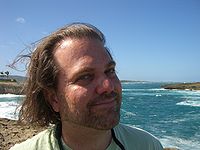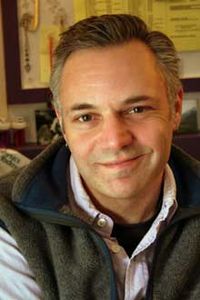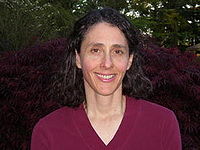Randomness, Structure and Causality - Bios: Difference between revisions
From Santa Fe Institute Events Wiki
No edit summary |
No edit summary |
||
| Line 40: | Line 40: | ||
<br /> | <br /> | ||
[[Image:dpf.jpg|left]] | [[Image:dpf.jpg|200px|left]] | ||
'''David Feldman''', Professor, Physics and Astronomy, College of the Atlantic; Co-Director, SFI Complex Systems Summer School, Beijing | '''David Feldman''', Professor, Physics and Astronomy, College of the Atlantic; Co-Director, SFI Complex Systems Summer School, Beijing | ||
| Line 50: | Line 50: | ||
<br /> | <br /> | ||
[[Image:mm2008.jpg|left]] | [[Image:mm2008.jpg|200px|left]] | ||
'''Melanie Mitchell''', Professor, Computer Science, Portland State University; External Professor and Science Board member, Santa Fe Institute. Melanie Mitchell received a Ph.D. in Computer Science from the University of Michigan in 1990. Since then she has held faculty or professional positions at the University of Michigan, the Santa Fe Institute, Los Alamos National Laboratory, the OGI School of Science and Engineering, and Portland State University. | '''Melanie Mitchell''', Professor, Computer Science, Portland State University; External Professor and Science Board member, Santa Fe Institute. Melanie Mitchell received a Ph.D. in Computer Science from the University of Michigan in 1990. Since then she has held faculty or professional positions at the University of Michigan, the Santa Fe Institute, Los Alamos National Laboratory, the OGI School of Science and Engineering, and Portland State University. | ||
Revision as of 19:55, 17 December 2010
| Workshop Navigation |

James P. Crutchfield, Professor of Physics and Director, Complexity Sciences Center, Physics Department, University of California at Davis
Jim is Professor of Physics at the University of California, Davis, and Director of the Complexity Sciences Center—a new research and graduate program. Prior to this he was Research Professor at the Santa Fe Institute for many years, where he led its Dynamics of Learning Group and Network Dynamics Program. In parallel, he was Adjunct Professor of Physics in the Physics Department, University of New Mexico, Albuquerque. Before coming to SFI in 1997, he was a Research Physicist in the Physics Department at the University of California, Berkeley, since 1985. He received his B.A. summa cum laude in Physics and Mathematics from the University of California, Santa Cruz, in 1979 and his Ph.D. in Physics there in 1983. He has been a Visiting Research Professor at the Sloan Center for Theoretical Neurobiology, University of California, San Francisco; a Post-doctoral Fellow of the Miller Institute for Basic Research in Science at UCB; a UCB Physics Department IBM Post-Doctoral Fellow in Condensed Matter Physics; a Distinguished Visiting Research Professor of the Beckman Institute at the University of Illinois, Urbana-Champaign; and a Bernard Osher Fellow at the San Francisco Exploratorium.
Over the last three decades Prof. Crutchfield has worked in the areas of nonlinear dynamics, solid-state physics, astrophysics, fluid mechanics, critical phenomena and phase transitions, chaos, and pattern formation. His current research interests center on computational mechanics, the physics of complexity, statistical inference for nonlinear processes, genetic algorithms, evolutionary theory, machine learning, quantum dynamics, and distributed intelligence. He has published over 110 papers in these areas, including the following recent, related publications. Most are available from his website: [[1]].

David Feldman, Professor, Physics and Astronomy, College of the Atlantic; Co-Director, SFI Complex Systems Summer School, Beijing
Dave's research training is in theoretical physics and mathematics, and his research interests lie in the fields of statistical mechanics and nonlinear dynamics. In particular, his research has examined how one might measure "complexity" or pattern in a mathematical system, and how such complexity is related to disorder. This work can be loosely categorized as belonging to the constellation of research topics often referred to as "chaos and complex systems." In his research, Dave uses both analytic and computational techniques. Dave has authored research papers in journals including Physical Review E, Chaos, Physics Letters A, and Advances in Complex Systems.
As a graduate student at UC-Davis, Dave received several awards in recognition of both teaching and scholarship: The Dissertation Year Fellowship; The Chancellor's Teaching Fellowship; and he was nominated for the Outstanding Graduate Student Teaching Award. Dave joined the faculty at College of the Atlantic in 1998, where he teaches a wide range of physics and math courses. He also teaches classes that explore connections between science and politics, such as Making the Bomb (about the Manhattan project and atomic weapons), and Gender and Science.

Melanie Mitchell, Professor, Computer Science, Portland State University; External Professor and Science Board member, Santa Fe Institute. Melanie Mitchell received a Ph.D. in Computer Science from the University of Michigan in 1990. Since then she has held faculty or professional positions at the University of Michigan, the Santa Fe Institute, Los Alamos National Laboratory, the OGI School of Science and Engineering, and Portland State University.
Melanie has served as Director of the Santa Fe Institute’s Complex Systems Summer School; at Portland State University she teaches, among other courses, Exploring Complexity in Science and Technology.
Her major work is in the areas of analogical reasoning, complex systems, genetic algorithms and cellular automata, and her publications in those fields are frequently cited. She is the author of An Introduction to Genetic Algorithms, a widely known introductory book published by MIT Press in 1996. Her most recent book is Complexity: A Guided Tour named by Amazon.com as one of the 10 best science books of 2009.
